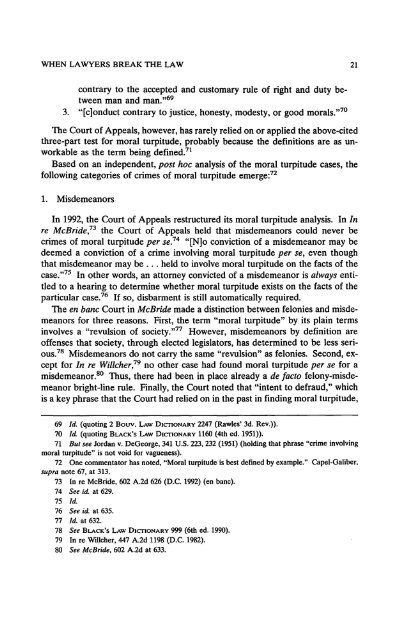The University of the District of Columbia Law ... - UDC Law Review
The University of the District of Columbia Law ... - UDC Law Review
The University of the District of Columbia Law ... - UDC Law Review
Create successful ePaper yourself
Turn your PDF publications into a flip-book with our unique Google optimized e-Paper software.
WHEN LAWYERS BREAK THE LAW21contrary to <strong>the</strong> accepted and customary rule <strong>of</strong> right and duty betweenman and man. ,,693. "[c]onduct contrary to justice, honesty, modesty, or good morals.,,7o<strong>The</strong> Court <strong>of</strong> Appeals, however, has rarely relied on or applied <strong>the</strong> above-citedthree-part test for moral turpitude, probably because <strong>the</strong> definitions are as unworkableas <strong>the</strong> term being defined.'lBased on an independent, post hoc analysis <strong>of</strong> <strong>the</strong> moral turpitude cases, <strong>the</strong>following categories <strong>of</strong> crimes <strong>of</strong> moral turpitude emerge:721. MisdemeanorsIn 1992, <strong>the</strong> Court <strong>of</strong> Appeals restructured its moral turpitude analysis. In Inre McBride,'3 <strong>the</strong> Court <strong>of</strong> Appeals held that misdemeanors could never becrimes <strong>of</strong> moral turpitude per se.'4 "[N]o conviction <strong>of</strong> a misdemeanor may bedeemed a conviction <strong>of</strong> a crime involving moral turpitude per se, even thoughthat misdemeanor may be ... held to involve moral turpitude on <strong>the</strong> facts <strong>of</strong> <strong>the</strong>case.,,75 In o<strong>the</strong>r words, an attorney convicted <strong>of</strong> a misdemeanor is always entitledto a hearing to determine whe<strong>the</strong>r moral turpitude exists on <strong>the</strong> facts <strong>of</strong> <strong>the</strong>particular case. 76 If so, disbarment is still automatically required.<strong>The</strong> en banc Court in McBride made a distinction between felonies and misdemeanorsfor three reasons. First, <strong>the</strong> term "moral turpitude" by its plain termsinvolves a "revulsion <strong>of</strong> society.,,77 However, misdemeanors by definition are<strong>of</strong>fenses that society, through elected legislators, has determined to be less seriOUS. 78 Misdemeanors do not carry <strong>the</strong> same "revulsion" as felonies. Second, exceptfor In re Willcher,'9 no o<strong>the</strong>r case had found moral turpitude per se for amisdemeanor. so Thus, <strong>the</strong>re had been in place already a de facto felony-misdemeanorbright-line rule. Finally, <strong>the</strong> Court noted that "intent to defraud," whichis a key phrase that <strong>the</strong> Court had relied on in <strong>the</strong> past in finding moral turpitude,69 Id. (quoting 2 Bouv. LAW DlcrIONARY 2247 (Rawles' 3d. Rev.».70 Id. (quoting BLACK'S LAW DlcrIONARY 1160 (4th ed. 1951».71 But see Jordan v. DeGeorge, 341 U.S. 223, 232 (1951) (holding that phrase "crime involvingmoral turpitude" is not void for vagueness).72 One commentator has noted, "Moral turpitude is best defined by example." Capel-Galiber.supra note 67, at 313.73 In re McBride, 602 A.2d 626 (D.C. 1992) (en banc).74 See ide at 629.75 Id.76 See ide at 635.77 Id. at 632.78 See BLACK'S LAW DlcrIONARY 999 (6th ed. 1990).79 In re Willcher, 447 A.2d 1198 (D.C. 1982).80 See McBride, 602 A.2d at 633.














